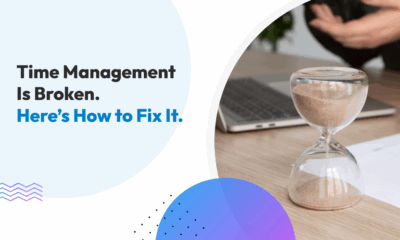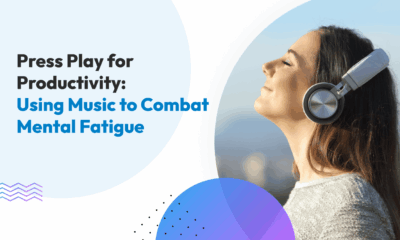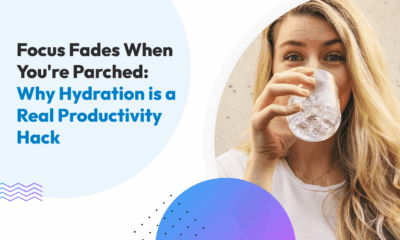Science Says
You Don’t Need Another Meditation App — Try This Science-Backed Stress Fix Instead
Let’s be real. Running a business means juggling approximately 7,342 things at once. Between deadlines, client fires, and that ever-growing to-do list, it’s no wonder we sometimes feel like we’re drowning in stress. Meditation apps are all the rage from Calm to Headspace, and while they’re useful for what they do (i.e., help you meditate if that’s your jam), they’re not the stress silver bullet we often hope they are when we hit download. And many people struggle to use them consistently. Is there another option? So glad you asked!
When stress really hits me, sleep is the first casualty. Then comes the fake productivity spiral. You know, refreshing my email for the 847th time, hoping there won’t be anything there so I can feel like I “did something.”
But what if I told you there’s a research-backed way to handle all this pressure without turning into a stress ball or sacrificing your sanity?
I recently dove into research from New Ideas in Psychology that completely changed how I think about stress management. The secret? Strategic playfulness.
Now, I’ll admit: I was skeptical. When I first saw “playfulness” as a stress solution. I thought “yeah, right.” I wouldn’t have connected any of what I do, and certainly not my puzzle-solving obsession or my family’s dark humor with something called “playfulness.” But stick with me, because this isn’t what you think.
Playfulness Isn’t What You Think It Is
The researchers studied over 500 people across different industries and discovered that playfulness isn’t just “being fun.” They define it as your ability to find engaging aspects in routine or challenging situations rather than seeing them as purely burdensome.
When I read that, something clicked. I spent YEARS trying random things to manage stress. Some worked, some definitely didn’t. Turns out, what I stumbled onto through trial and error has a name: strategic playfulness. If only I’d had this framework earlier!
When I started my first business in translation, I loved it because every project was a puzzle to solve. Productivity itself? Just another puzzle game. Even as a kid, when I literally couldn’t take tests because of paralyzing fear (my brain is weird), I turned it into a game. I’d flip the test over and write a memorized “cheat sheet” on the back before looking at any questions. It felt like I was cheating (even though I wasn’t), which somehow made the whole thing less scary.
The study revealed that playfulness actually breaks down into four distinct types:
1. Intellectual Playfulness: This is when you genuinely enjoy complex problems and seek creative solutions. (Hello, my entire approach to business!)
2. Lighthearted Playfulness: Maintaining a carefree approach when plans inevitably go sideways. Learning to laugh when things go wrong instead of spiraling.
3. Other-Directed Playfulness: Using humor to ease tense situations. I recently realized my family does this naturally. We even joke during the darkest moments (probably more). It’s how we cope.
4. Whimsical Playfulness: Embracing unconventional approaches. Always believing a solution can be better, even if it means going down a few rabbit holes. Good news for those of us who love a good rabbit hole!
Reading these, I realized I actually tap into all four types without even thinking about it. And according to the book Switch by Chip and Dan Heath, when we find these “bright spots” (things that are already working), we can leverage them to create change elsewhere. Maybe you’re already using some types of playfulness too, without realizing it?
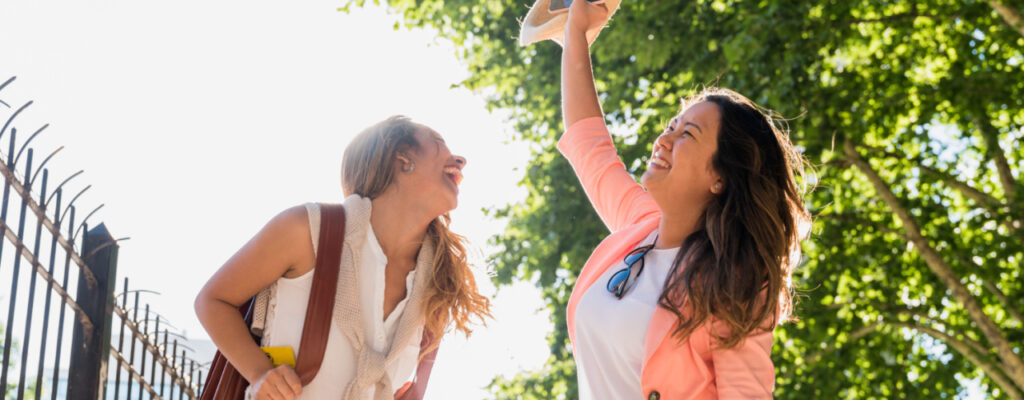
How Playfulness Actually Fights Stress (According to Science)
Now here’s where the research gets really interesting. The scientists looked at how different types of playfulness relate to how we cope with stress.
They identified two main categories of coping strategies:
Positive coping strategies (the ones that actually help):
- Control coping: Actively managing stressors
- Distraction coping: Taking healthy mental breaks
- Devaluation coping: Putting problems in perspective
Negative coping strategies (the ones I know way too well):
- Escape: Avoiding the problem entirely
- Rumination: Replaying the same problem on loop
- Resignation: Just giving up
- Self-blame: My personal default setting
Intellectual playfulness showed the strongest associations with positive coping strategies, while lighthearted playfulness was specifically effective at reducing negative coping strategies.
This explains so much! When I spiral into self-blame, I use what’s essentially an intellectual puzzle to get out: What do I know to be true with actual proof? What do I only think might be true? What’s definitely false? Most self-blame doesn’t survive this logic test.
The Perfectionism-to-Playfulness Pipeline
Speaking of spirals, let me share a quick embarrassing stroy. As a kid, if someone interrupted me while reading, I would start the ENTIRE BOOK OVER. From page one. I’m not kidding. My parents were worried I had OCD.
Now? I’m still working on letting go of perfectionism, but I’ve come a long way. The difference? I’ve engineered systems and strategies to work with my brain instead of against it.
Some of my best work has come when I let go of that rigid control. One of my most viral blog posts, “Need more work? It’s not them, it’s you. And that’s the best news you’ve heard all day,” was written at 3 am in one shot. I was just thinking about strategies freelancers could control, felt strongly about it, word-vomited onto the page, and hit publish. No perfectionism, no overthinking. Just… play?
Side note: If I could go back, I’d have created a series of voice notes and gone to sleep at a reasonable time. The next day was rough to say the least, but I digress.
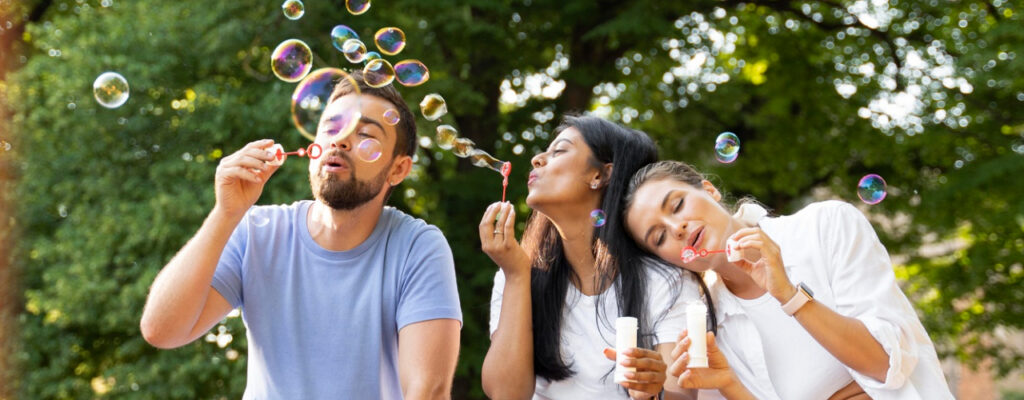
People Can Actually See Your Playfulness (And That’s a Good Thing)
One surprising finding? Your playfulness isn’t just an internal trait. It’s highly visible to others. When you think you’re being playful, other people notice.
This visibility matters because:
- It signals to clients and colleagues that you handle stress well
- It shows you approach problems creatively
- It can improve team dynamics and relationships
The research showed that other-directed playfulness (humor in social situations) is the most observable type. Which explains why my family’s coping-through-humor is so noticeable, and probably why it actually helps us get through tough times together.
The Life Satisfaction Connection
Here’s the kicker: the study found that playfulness was positively associated with life satisfaction, but primarily through better stress management. It’s like a domino effect: more playfulness → better coping → happier life overall.
Intellectual and other-directed playfulness had bonus benefits beyond just stress management. Meanwhile, lighthearted playfulness worked only through reducing negative coping patterns.
For those of us prone to rumination and self-blame (hi, it’s me), this is huge. Developing lighthearted playfulness isn’t just nice to have. It’s a direct antidote to our worst stress habits.
But What About Time?
I know what you’re thinking because I thought it too: “Jenae, I have ACTUAL DEADLINES.”
The researchers addressed this head-on. Yes, being playful might “cost” time in the moment. But that time is an investment in not spending hours:
- Stuck in email refresh loops
- Redoing work because stress made you sloppy
- Recovering from stress-induced insomnia
- Ruminating about problems without solving them
I use an AppBlocker to physically prevent myself from checking work apps on evenings and weekends. Why? Because that “quick email check” turns into an hour of fake productivity. The playful alternative? Actually taking a break. Revolutionary, I know.
One of my clients recently discovered something similar about time “costs.” She’d been struggling with overwhelm until she started tracking her energy and time. She discovered that taking time to rest (beach days for her) is essential and actually gives back in terms of energy and focus. She could literally see that the ROTI (return on time investment) of something like going to the beach is measurable, crucial, and an actual investment in her productivity.

Making This Work in Real Life
So how do we actually use this? I’m always looking at myself in addition to helping my clients, but here’s a breakdown of some ways we can all use playfulness to tackle some of our ‘negative’ defaults:
If you tend to escape/avoid (hello, email refresh loop):
- Set a timer and face the scary task for just 10 minutes
- Make it a game: “What’s the smallest step I could take?”
- Use other-directed playfulness: body double with a friend or coworking buddy
If you’re stuck in rumination loops:
- Try intellectual playfulness: turn the problem into a puzzle to solve
- Use distraction coping: take a real break (not fake productivity)
- Write the problem as a headline 10 years from now – does it still matter? For perspective
If resignation is your go-to (“why even bother”):
- Look for one tiny bright spot that IS working
- Use lighthearted playfulness: what would make this 5% more fun?
- Remember: play is about experimenting, not perfection
If self-blame is your default (definitely me):
- Use the logic puzzle approach: what’s actually proven true?
- Practice devaluation coping: compare to actual disasters for perspective
- Channel it into intellectual play: “How would I solve this for a friend?”
Track what works:
- Notice when fake productivity hits
- Observe what helps you shift gears
- Look for patterns in your best work
The Bottom Line
This research validated something I’ve been accidentally stumbling onto for years: using different types of “play” to manage stress and solve problems. From turning test anxiety into a “cheating” game to seeing business challenges as translation puzzles, playfulness has been one of my key unintentional strategies all along.
In a world where every productivity guru is pushing another rigid system, isn’t it refreshing to know that sometimes being “unproductive” IS productive? That taking a break, approaching problems playfully, or finding the humor in a situation might actually be the most productive thing you can do?
As business owners, we could work 24/7 and still leave things undone. That’s just reality. But maybe…just maybe…approaching it all with a bit more playfulness could make the journey not just bearable, but actually enjoyable.
So here’s my challenge: This week, pay attention to where you might already be using playfulness without realizing it. When you catch yourself in a stress spiral or fake productivity loop, try one small playful shift. Maybe approach that problem like a puzzle. Maybe find one tiny thing to laugh about. Maybe take that beach day and track your energy after.
Let me know what you discover. I’ll be over here, still learning to let go of perfectionism one playful moment at a time. 💪
P.S. If you’re worried being playful makes you less professional, remember that I built a successful business while making dark jokes during family crises and writing viral posts at 3am. Professional is as professional does, and sometimes professional solves problems like puzzles while wearing pajamas. You’ve got this.
Sources & Notes
Limitations of the Study
While this research provides valuable insights into the relationship between playfulness and stress management, it’s important to understand its limitations when applying these findings to your business or freelance work.
Cross-Sectional Design: Both studies measured playfulness, coping strategies, and life satisfaction at a single point in time. This means we can’t definitively say that developing playfulness will cause better stress management or higher life satisfaction—we only know these factors are associated. The researchers acknowledge that “any interpretation of the causal or predictive influences of playfulness and stress coping on life satisfaction cannot be ascertained.”
Limited Occupational Diversity: While the second study included employees from various industries, the specific findings about different types of playfulness suiting different work contexts come primarily from nursery school settings and cited research comparing police officers to librarians. More research is needed to understand how these findings apply across diverse business contexts and entrepreneurial roles.
Cultural Context: Both studies were conducted primarily in German-speaking countries (Germany, Switzerland, Austria). Cultural attitudes toward playfulness and work may influence these results, and findings might vary in other cultural contexts.
Self-Reported Measures: The study relied heavily on participants’ self-reports of their playfulness, coping strategies, and life satisfaction. While peer ratings validated playfulness assessments, the coping and satisfaction measures could be influenced by social desirability bias or limited self-awareness.
Trait-Based Assessment: The research focused on general playfulness tendencies rather than situational playfulness responses. How someone responds playfully to specific, real-world business challenges might differ from their general playful disposition.
Effect Sizes: The research found small to moderate associations (correlations in the .20-.30 range) between playfulness and positive outcomes. This means playfulness has a measurable impact on stress management and life satisfaction, though not overwhelming.
Despite these limitations, the consistency of findings across two different populations and the strong theoretical foundation make this research a valuable starting point for experimenting with playfulness in your work life. Consider these findings as evidence-based suggestions to test in your own context rather than guaranteed outcomes.
About the Research
Nancy Tandler, Stanley Schilling-Friedemann, Leslie D. Frazier, Rebekka Sendatzki, René T. Proyer,
New insights into the contributions of playfulness to dealing with stress at work: Correlates of self- and peer-rated playfulness and coping strategies, New Ideas in Psychology, Volume 75, 2024, 101109, ISSN 0732-118X, https://doi.org/10.1016/j.newideapsych.2024.101109.
(https://www.sciencedirect.com/science/article/pii/S0732118X24000370)
Abstract:
Playfulness is an individual difference variable that enables people to experience and (re)frame situations of everyday life as interesting, entertaining, and/or stimulating. This definition is consistent with a structural model that includes four different playfulness facets: other-directed, lighthearted, intellectual, and whimsical playfulness. In the work context, playfulness has been shown to be related with various outcomes such as innovative behavior or intrinsic goals. We tested adult playfulness’ associations with coping strategies employed at work and whether these coping strategies help to transfer the expected association between playfulness and employees’ life satisfaction. Study 1 (N = 185; nursery school trainees) provides support for our hypothesis that playfulness is associated with more positive and less negative coping strategies when being confronted with general and work-specific stress. Study 2 (N = 355; employees from various working fields) confirms our results from study 1 by demonstrating that playfulness is related to adaptively coping with work stress. Further, study 2 shows that some playfulness facets were positively related to life satisfaction and that these associations were transferred by coping less negatively with work stress and, to some degree, also by utilizing positive control strategies. Overall, our findings indicate that adults’ playfulness is of importance for coping with stress at work and to further explain employees’ life-satisfaction. Directions for future research on playfulness in the work place are discussed.



